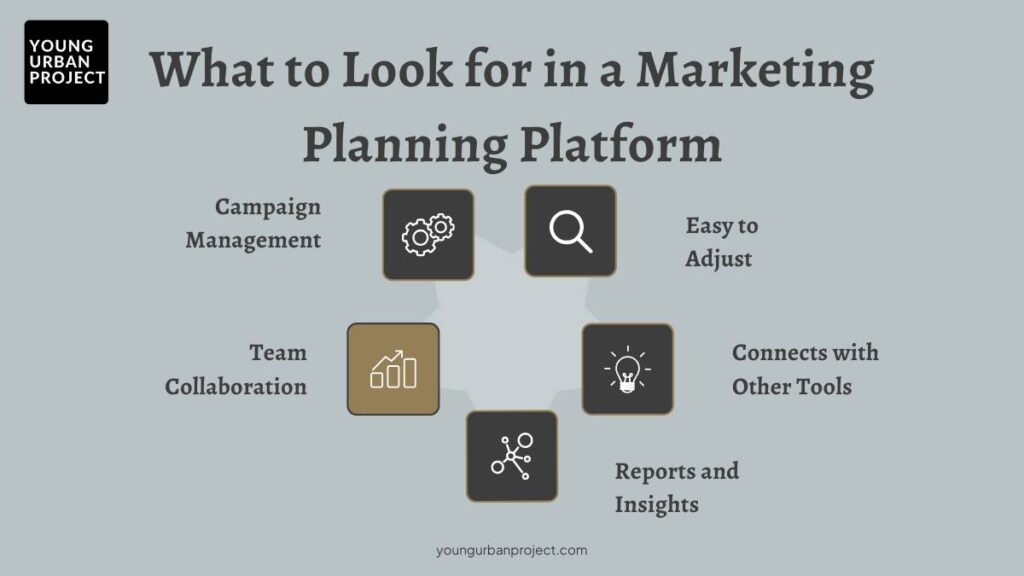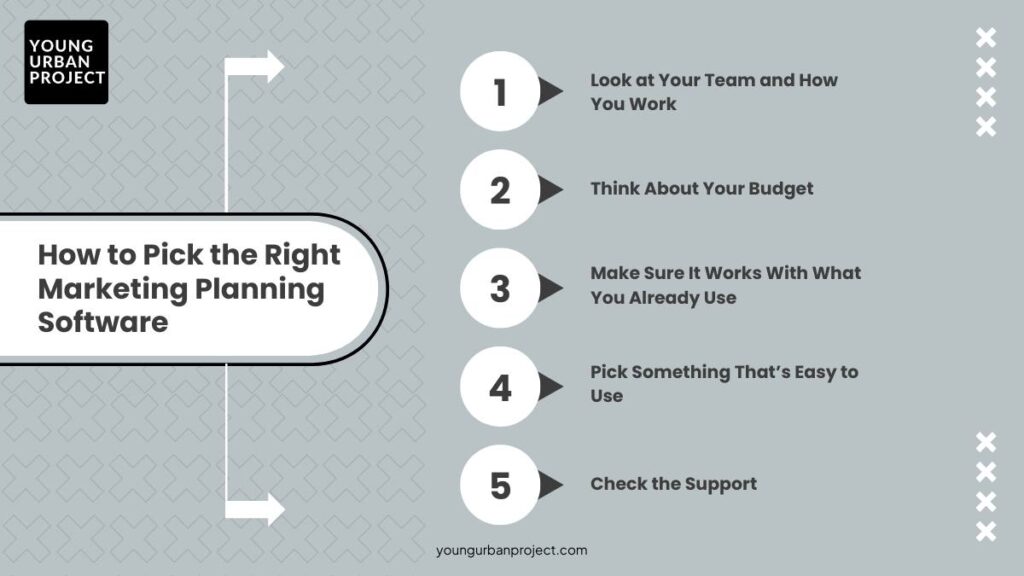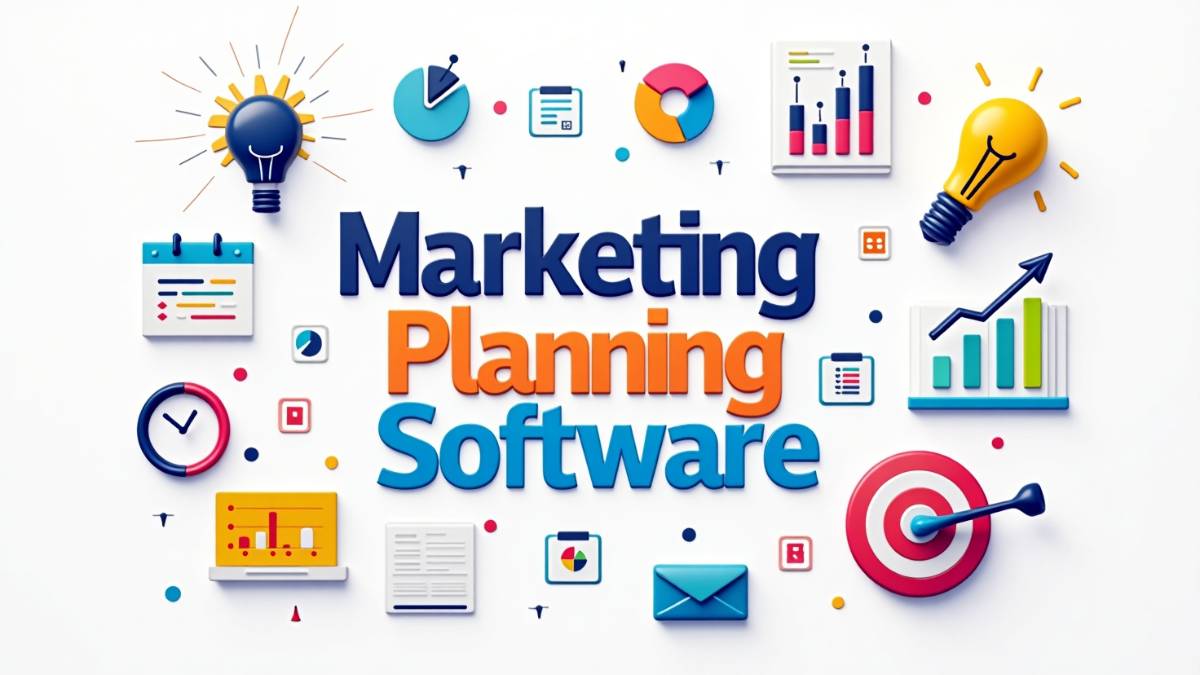Let’s be honest, marketing can get messy. There are campaigns to run, deadlines to hit, people to manage, and a million little things in between.
Table of Contents
That’s why using the right tool matters.
Marketing planning software helps you keep everything organized. It gives your team one place to plan, talk, track progress, and actually get stuff done. Without it, things can easily fall through the cracks. With it, work just flows better. This guide will help you navigate the options, covering essential features, top tools, and tips for choosing and implementing the right software for your needs.
What is Marketing Planning Software?
Think of marketing planning software like your team’s digital whiteboard, but way more powerful.
It’s where all your marketing plans live, the tasks, the deadlines, who’s doing what, and whether things are actually working. No more digging through endless email chains or hunting down that spreadsheet someone updated three versions ago. Keep everything organized in one shared hub everyone can reach.
Without these tools, marketing teams get lost in the weeds fast. People miss important updates. Someone redoes work that’s already finished because nobody told them. Deadlines sneak up without warning. Even a digital marketing expert can struggle to stay organized without the right systems in place, and the stress builds up.
Using actual planning software keeps everyone on the same page, makes teamwork smoother, and lets you see clear as day what’s paying off and what’s just wasting your budget.
What to Look for in a Marketing Planning Platform

Campaign Management
You need to see your whole campaign at a glance, the goals, tasks, deadlines, and progress. Everything is connected, so you can spot problems before they blow up. When it all lives in one place, things just flow better. You spend less time checking in and more time getting actual work done.
Team Collaboration
Good tools make teamwork easier. Look for something that lets you tag teammates, leave comments, and share updates. This way, everyone knows what’s happening and nothing gets lost in long email chains.
Reports and Insights
You need to see if your work is getting good results. A good tool should show easy reports about what’s going well, what’s not, and how your campaigns are doing.
Connects with Other Tools
If you’re using things like email marketing software, CRMs, or social media tools, your planning software should connect with them. This saves you from jumping between different apps and doing the same work twice.
Easy to Adjust
Whether you grow fast or restructure, your system should handle it. The best tools can be customized a bit to fit your style, and they should be able to grow with you, so you don’t have to start over later.
Also Read: Top Lead Generation Software
Top Marketing Planning Software Tools
1. Brandfolder
If your team handles a lot of visual content, logos, videos, images, Brandfolder can be a lifesaver. You can store and manage all your brand content in one easy-to-access location.
Why it’s good:
- Keeps your brand looking consistent
- Easy to find and share files
- Lets you control who can access what
- Great for creative teams and agencies
2. Brevo (formerly Sendinblue)
Brevo is a handy tool for email marketing and simple automation. It’s made for small teams that want to send emails without overcomplicating things.
Why it’s good:
- Drag-and-drop email builder
- Automation for basic workflows
- SMS marketing options too
- Works well for small to mid-size businesses
3. Asana
Asana is a popular tool for managing all kinds of projects, not just marketing. But it works great for marketing teams who want a clean way to organize tasks and see who’s doing what.
Why it’s good:
- Simple layout with lists, boards, and timelines
- Task assignments and due dates
- Helps teams stay focused and on the same page
- Easy to use for beginners
4. Monday Marketer
This is the marketing-specific version of Monday.com. It’s designed just for marketing teams, with templates and workflows that fit how marketers work.
Why it’s good:
- Built-in templates for marketing campaigns
- Visual dashboards to track progress
- Helps with campaign planning and budget tracking
- Made for marketers from the start
5. GETitOUT
GETitOUT is a smart tool that helps you build marketing personas and create content that speaks directly to your audience. Good for smaller teams that don’t have time to build everything from scratch.
Why it’s good:
- Helps you define buyer personas
- Suggests messaging based on those personas
- Easy content creation tools
- Great for B2B and startup teams
6. HubSpot Marketing Hub
HubSpot’s marketing platform is kind of an all-in-one setup. It handles emails, landing pages, forms, analytics, basically, most things a marketer needs in one place.
Why it’s good:
- Email marketing and automation
- CRM is included for tracking contacts
- Built-in analytics and lead scoring
- Ideal for teams that want everything in one tool
7. Wrike
Wrike is a solid tool for teams that want structure without too much setup. It works well for marketing, design, or any team that juggles a lot of moving parts.
Why it’s good:
- Easy task and project tracking
- Visual dashboards and timelines
- Lets you add approvals and custom workflows
- Good for mid-size to large teams
8. CoSchedule Marketing Suite
CoSchedule is built for content marketers. If you’re running a blog, managing social posts, or planning campaigns, this tool helps you keep it all lined up.
Why it’s good:
- Content calendar that’s super visual
- Helps plan blog posts, emails, social, etc.
- Built-in automation for posting and reminders
- Keeps all your content in one place
Also Read: Product Lifecycle Management Software
9. PushSend
PushSend is a simple tool focused on email and SMS campaigns. It’s not overloaded with features, which makes it great if you just want to send messages without a learning curve.
Why it’s good:
- Easy-to-use email editor
- Send SMS and email from one tool
- Good basic automation features
- Works for smaller teams and local businesses
10. Markey
Markey helps you manage marketing resources, things like budgets, tasks, and team schedules. It’s made for marketers who want a better grip on everything behind the scenes.
Why it’s good:
- Tracks time, budgets, and workload
- Helps with campaign planning
- Makes resource allocation easier
- Good for teams handling multiple projects at once
11. Qurate
Qurate is all about content curation and getting it in front of the right people. If you share a lot of articles, videos, or social posts, this tool can help keep it organized.
Why it’s good:
- Let’s you collect and share content
- Helps schedule posts and track engagement
- Easy to collaborate with teammates
- Useful for newsletters or social media teams
12. Audiense
Audiense helps you understand your audience better. It’s focused on segmentation and insights, so you know exactly who you’re talking to and how to reach them.
Why it’s good:
- Builds detailed audience profiles
- Great for social listening and research
- Helps with targeting and messaging
- Ideal for brands that care about audience data

Enroll Now: Live Advanced Digital Marketing Course
13. StoryChief
StoryChief is perfect if your team works on a lot of content together, blogs, social posts, newsletters. It helps you write, plan, and publish everything in one spot.
Why it’s good:
- Central place for writing and editing content
- Lets your team collaborate easily
- Publish to multiple channels at once
- Built-in SEO and analytics tools
14. Funnel Plan
Funnel Plan is built for B2B marketers who want to think more strategically. It helps you plan out your full marketing funnel and align it with sales.
Why it’s good:
- Helps build clear marketing strategies
- Aligns sales and marketing teams
- Focuses on long-term planning, not just tasks
- Great for B2B and SaaS marketing companies
15. Notion
Notion isn’t made just for marketers, but tons of marketing teams use it to plan, share docs, track projects, and keep ideas organized.
Why it’s good:
- Super flexible, works how you want it to
- Great for notes, docs, and content calendars
- Easy to share and collaborate
- Clean and simple interface
16. Smartsheet
Smartsheet feels like a spreadsheet but acts like a project management tool. If your team is used to Excel, it’s a smooth transition.
Why it’s good:
- Spreadsheet-style interface
- Helps track timelines, budgets, and resources
- Great for big campaigns and cross-team work
- Supports automation and dashboards
Also Read: 15 Best WhatsApp Marketing Software
17. Factors.AI
Factors.AI is a tool that helps marketing teams understand which channels and actions are actually driving results. Think of it like your campaign detective.
Why it’s good:
- Tracks marketing performance in detail
- Helps with attribution, what really worked
- Gives insights you can act on
- Especially useful for data-driven teams
18. Toggl Plan
Toggl Plan is great if you want something simple, visual, and easy for planning projects. It’s especially useful if you don’t want a steep learning curve.
Why it’s good:
- Drag-and-drop timeline planning
- Easy to assign tasks and set deadlines
- Nice, clean visuals for team planning
- Good for small to mid-sized teams
19. ClickUp
ClickUp is one of those all-in-one tools that tries to do everything. Tasks, docs, goals, dashboards, you name it, it’s in there.
Why it’s good:
- Customizable for any kind of team
- Combines task management, docs, and more
- Great for teams who want everything in one place
- Scales well as your team grows
20. Airtable
Airtable looks like a spreadsheet but works more like a database. It’s awesome for keeping track of campaigns, assets, and team workflows.
Why it’s good:
- Super flexible, works for lots of use cases
- Great for content calendars, tracking assets
- Easy to sort, filter, and organize info
- Looks simple but can do a lot
21. Teamdeck
Teamdeck helps you manage your team’s time and workload. It’s especially helpful if your team handles multiple projects or freelancers.
Why it’s good:
- Schedule who’s working on what
- Track time and availability
- Helps avoid burnout and overbooking
- Good for resource planning
22. Welcome
Welcome is made for marketers who run big campaigns across multiple channels. It brings everything, people, tasks, and content, into one place.
Why it’s good:
- Keeps campaigns organized
- Supports planning, publishing, and approvals
- Built for large marketing teams
- Helps with both strategy and execution
23. Narrato Workspace
Narrato is a tool that helps with content writing, editing, and managing workflows. Great for teams working on blogs, SEO, or social content.
Why it’s good:
- Helps plan and write content
- Built-in editor with SEO checks
- Assign tasks and track progress
- Ideal for content-focused teams
24. Gain
Gain is a simple but helpful tool for getting content approved faster. No more chasing people over email to approve posts or visuals.
Why it’s good:
- Easy approval workflows for content
- Works for social posts, designs, videos
- Great for agencies or busy teams
- Speeds up review and feedback
25. Trello
Trello is one of the easiest tools out there for managing projects. If your team loves using boards and sticky notes, you’ll feel right at home here.
Why it’s good:
- Simple drag-and-drop board view
- Great for tracking tasks and deadlines
- Easy to use, even for beginners
- Works well for smaller teams or solo marketers
26. Confluence
Confluence is more for documentation than task management, but it’s super useful when your team needs a space to write, store, and share information.
Why it’s good:
- Great for creating guides, plans, and notes
- Keeps everything in one organized space
- Integrates well with tools like Jira or Trello
- Perfect for building a marketing knowledge base
27. BrandMaker
BrandMaker is made for big marketing teams that need to manage a lot, campaigns, budgets, assets, approvals, everything. It’s more advanced but super powerful.
Why it’s good:
- Helps with planning, budgeting, and asset control
- Designed for large, global teams
- Keeps everything structured and consistent
- Best for enterprise-level marketing management
Also Read: Top 25 Content Marketing Tools
How to Choose the Right Marketing Planning Software

Look at Your Team and How You Work
Before picking any tool, take a step back and think about your team. How big is it? Do you work all in one place or remotely? Do you handle a few projects or a bunch at once? The answers will help you figure out what kind of tool actually makes sense.
Think About Your Budget
Money matters. Some tools are free, some are cheap, and some are… not so cheap. Be clear about what you can afford each month. And check how pricing works, some charge by the number of people using it, some don’t. A free trial is always a good idea before spending anything.
Make Sure It Works With What You Already Use
You probably already use things like email, Google Drive, Slack, or something similar. It helps a lot if your new tool connects with those. That way, you’re not copying stuff between apps all day. Less back and forth, more getting things done.
Pick Something That’s Easy to Use
If the tool is too complicated, no one’s going to use it. Look for something that just makes sense when you open it. You shouldn’t need a training course to figure out how to assign a task or make a to-do list.
Check the Support
Sometimes things break or don’t work how you expect. That’s normal. What matters is how fast you can get help. Good support, like live chat or easy help articles, can save you a lot of stress later. Also nice if there’s a community or forum to learn from other users.
Also Read: 52 Best Affiliate Marketing Tools
Best Practices for Using Your Marketing Planning Software
Know What You Want It to Do
Before you start using it, ask yourself: what do we actually want from this tool? Maybe it’s to plan better, maybe it’s just to keep track of deadlines. Whatever it is, being clear helps you use the tool the right way from day one.
Show the Team How to Use It
Don’t just say “Hey, we’re using this now” and drop a link. Take a little time to show people around, how to create tasks, where to find stuff, how to leave comments. Makes a big difference.
Keep Things Updated
Once you’re using the tool, don’t forget about it. Plans change, deadlines shift. Make it a habit to check in and update things so your team always knows what’s going on. A tool only works if the info in it is right.
Ask for Feedback
After a few weeks, check in with the team. Is the tool helping? Is anything confusing? Maybe a feature is great, maybe another one’s a pain. Getting honest feedback helps you tweak how you use it so it works better for everyone.
Conclusion
Marketing planning tools aren’t just nice-to-haves anymore, they’re essential for keeping your team on track in today’s fast-paced world. The right software cuts through the chaos, bringing structure to your campaigns and clarity to your team. Take time to find a tool that actually fits how your team works, not one that forces you to change everything. Remember, marketing moves fast, and your planning needs to keep up. Stay flexible, keep learning, and don’t be afraid to switch tools if something isn’t working.
FAQs: Marketing planning software
1. What is marketing planning software?
It’s basically your marketing command center, a place where you can map out campaigns, assign tasks to team members, track deadlines, and see how everything’s performing. Instead of having info scattered across emails and spreadsheets, it brings everything into one organized hub that keeps everyone on the same page.
2. Why is marketing planning software important?
Because marketing gets messy fast. Without proper tools, deadlines get missed, communication breaks down, and nobody really knows what’s working. Good planning software cuts through that confusion, helps your team collaborate better, saves tons of time on admin stuff, and gives you actual data on what’s paying off.
3. Can small businesses benefit from marketing planning tools?
Absolutely. Small teams might need these tools even more since they’re juggling so many responsibilities. Many platforms offer scaled-down versions perfect for small businesses, with just the essential features and reasonable pricing. They help small teams look and perform like much larger operations.
4. Are there free marketing planning software options?
Yep, plenty. Tools like Trello offer solid free plans that work great for basic planning. Notion, Airtable, and some others have free tiers too. They might limit how many projects or users you can have, but they’re perfect for testing the waters or for smaller teams just getting started.
5. How do I ensure successful implementation of a new marketing tool?
Don’t just drop it on your team and hope for the best. Start with proper training, even just a 30-minute walkthrough helps. Set clear expectations about how and when everyone should use it. Start small with one project rather than moving everything at once. And check in regularly to see what’s working and what’s not.
6. How often should I review my marketing plan?
At minimum, quarterly, but monthly is better. Markets change, competitors make moves, and what worked yesterday might not work tomorrow. Regular check-ins let you spot problems early and double down on what’s working. The best teams build review time right into their calendar rather than waiting for things to go wrong.

